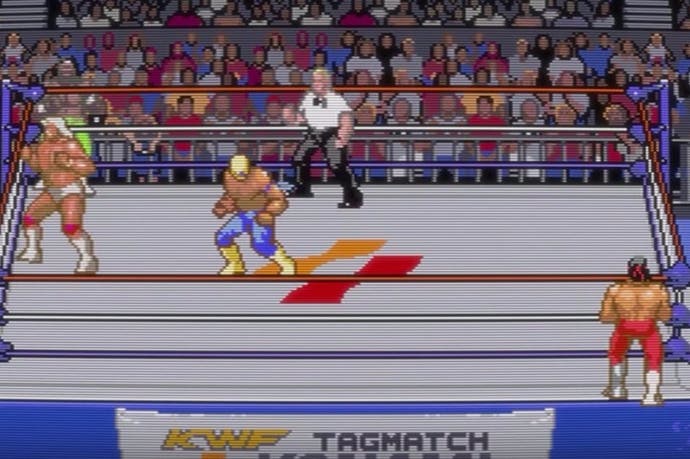Introducing Multibowl!: QWOP creator Bennet Foddy's private game that will never be released
Due to a slew of copyright issues.
QWOP and Pole Riders developer Bennett Foddy is a master of the absurd. After taking the internet by storm with his goofy browser game about the world's most poorly coordinated athlete, he followed it up with a physics game about clumsy pole vaulters and a 16-player real-time version of chess.
Yet it's Foddy's most recent experiment, Multibowl!, made with the help of his colleague AP Thomson, that takes the cake. A medley of over 230 commercial games from the early 80s to mid 90s, Multibowl! is like a mix of WarioWare with a retro game convention. Each title is set to a 30-second timer with one point assigned to whoever completes the goal first. Sometimes this is slaying your opponent in the original Mario Bros., other times it's scoring a goal in Sensible Soccer, and sometimes it's acquiring the highest score in Bubble Bobble. The first player to 10 points wins.
Each game is introduced with a title screen stating the name of the game, its publisher, the year it was released, and your objective ("KO your opponent", for example). In this way it actually serves as a sample platter of arcade classics, introducing folks to many mysteries of gaming's yesteryear they may otherwise have missed out on.
Despite the labels, it's still a legal nightmare. When asked how he hasn't been sued, Foddy tells me "Simple: We're not releasing it."
But fame and fortune were never part of the appeal in making Multibowl!. Instead, Foddy and Thomson wanted to preserve the games from their heyday and the pair enjoyed the challenge of repurposing such classics in a fresh, accessible way.
Assembling the package was more than just a good idea; it was the result of decades of open-source emulation work that brought us to the point where Foddy's pet project could even be conceived. Since the mid 90s game historians have been working on an ever-expanding emulator called MAME (Multi-Arcade Machine Emulator). Separately, there was another emulator called MESS (Multi-Emulator Super System) making the rounds. It wasn't until last year, however, that the two projects combined into one giant codebase.
"It was something I'd been wanting to do for a while," Foddy tells me. "That's the thing that creates the idea that 'this is now a single emulator that can emulate anything.' It sucks using emulators. You have to get these roms and get everything set up and they often don't work the way you want them to. You may need to learn weird procedures for getting Commodore 64 games to load. Every game has a slightly different set of instructions you need just to get the game working."
"As somebody who's been interested in the historical side of games for a long time, that's just a horrible part of trying to play things that are on dated hardware. It got me thinking when they joined these things together that maybe you could have a kind of curated set of games that were already set up."
But Foddy didn't just want to archive his favourite games. Oh no. There are lots of people working on that. His ambition was more whimsical, more playful: He wanted to mash them up into something new. Something that whisked players straight into their highlight reel.
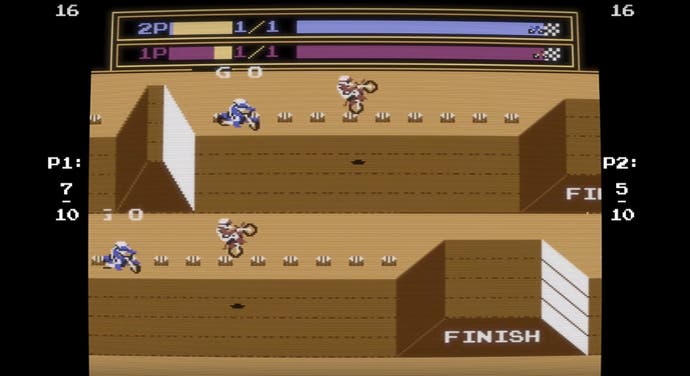
"What if you didn't have to go through the process of starting a game and going through the tutorial level and all of that sort of boring stuff that isn't the fun bit of the game?" Foddy says. "What if it just jumped you into the good bit?' And it's easier with multiplayer games to realise this."
From there, Foddy recruited Thomson for his technical know-how and the two had a working prototype in a scant three days. The next thing on the agenda was to expand Multibowl!'s library. The criteria was that these games needed to be two-player, real-time, and not simply a re-skin of other games with similar mechanics.
"It has to be a game that can be played meaningfully in a 30-second chunk and with sort of standard controls. And that it not as big a slice of gaming history as you might think," Foddy says. "I think many of the most well-loved and famous games do in fact fit that, but not the overwhelming bulk of games that have ever been made. And also trying to avoid things that are identical. There are a lot of basketball games, for example, that play a lot like NBA Jam. "
"There's also this amazing number of games that people have this memory of them being two-player, but aren't," Thomson chimes in. "Like I came in one day and asked Bennett 'Why is F-Zero not in there?'"
"Everybody loves F-Zero," Foddy laughs. "They get so mad. 'Put F-Zero in!' It's like '[But] it's not two-player!'
After asking for suggestions and doing a fair bit of research, Foddy and Thomson compiled around 230 retro games to put into their colossal collection. Some games even have multiple appearances with different criteria associated with each.
"I found a very diverse set of games in the end," Foddy says.
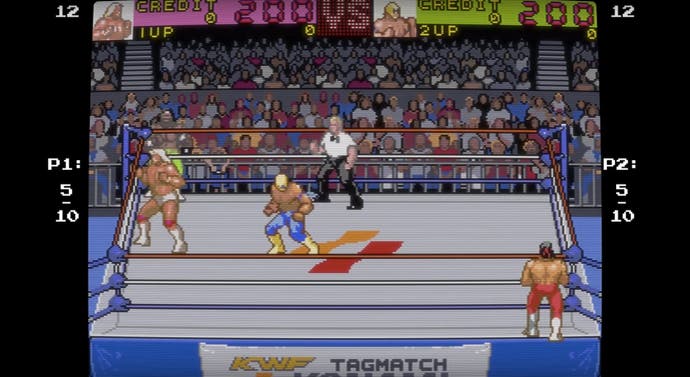
Beyond just being a medley of different titles, Foddy and Thomson enjoyed re-jigging the win conditions to create further chaos. "It's just sort of an interesting process for creating a game in the sense that you're repurposing this technology and coming up with something else. From a design standpoint it's like you as a designer are kind of more of a curator than thinking 'oh, I'm going to put this UI bar over here' and that kind of thing," Thomson says.
"Exactly!" Foddy replies. "Just deciding what games to put in and what the victory conditions should be, there's a lot of interesting design work there. As a game designer it's always interesting to be in what feels like uncharted territory, which in this case is trying to figure out what it means to build a game out of other games."
Often the results are unexpected, but humorously so. Foddy intended to make Eugene Jarvis' 1988 beat-'em-up Narc less violent by making the objective to arrest, but not kill, more drug users than your competitor. The result: players would arrest one person, then slaughter everyone else so their rival couldn't take anyone alive.
"My first impulse was that maybe that would be a nicer version of that game," Foddy laughs.
"I definitely think that sense of confusion and not knowing what to do has to be the core of the experience. I think the only way to avoid that would be to pick a whole bunch of middle of the road games with very, very simple mechanics. The fun of it sort of comes from the diversity of the experience. Like you sort of have to embrace and lean into the confusingness of it."
Indeed Multibowl! is confounding in play, but that weirdly adds to its charm in the event scene. Played at my local arcade/bar, Ground Kontrol, I had a blast with it, even if I didn't understand what I was doing in half the games. The vast majority of the time my opponent would be equally perplexed. We'd scramble to experiment with what the buttons do, rush towards our goal, then cry with laughter upon failing to serve in Sanrio Cup two-seconds into our trial. That's just how things go in Multibowl!
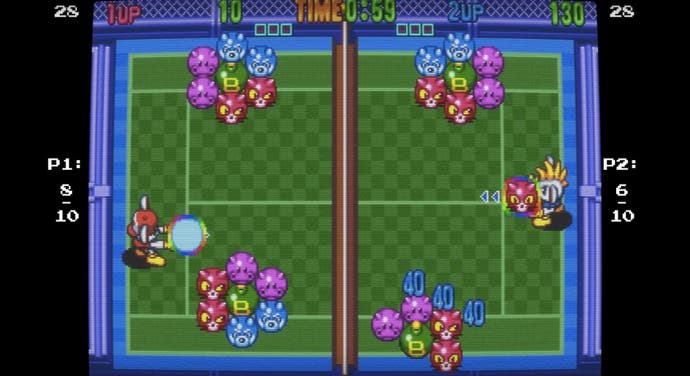
But Multibowl! will always be a private affair. When asked about any potential release plans for Multibowl!, even as a free offering, Foddy says that will never happen. "Archive.org has been putting thousands upon thousands of emulated games online using the javascript-compiled version of MAME and MESS. Basically you can just go to that website and play pretty much any game from prior to like 1995 or so. Even later in some cases. Their strategy has been that if anyone asks them to take a particular game down they'll do it. Because of the DMCA legislation that relatively seems like protection from getting sued. But I don't know if I'm as brave as that."
At a push maybe Foddy and Thomson could get permission for most of these games, as no one is going to accept a clearly cited 30-second chunk of a game randomly shuffled into a deck of hundreds as a substitute for the real thing. Even if Nintendo and few others were persnickety about it, there would still be no shortage of retro content. The problem with this is a technical one as Multibowl! actually contains its roster's entire titles in its data pool, even if it only plays pre-selected segments in the game proper.
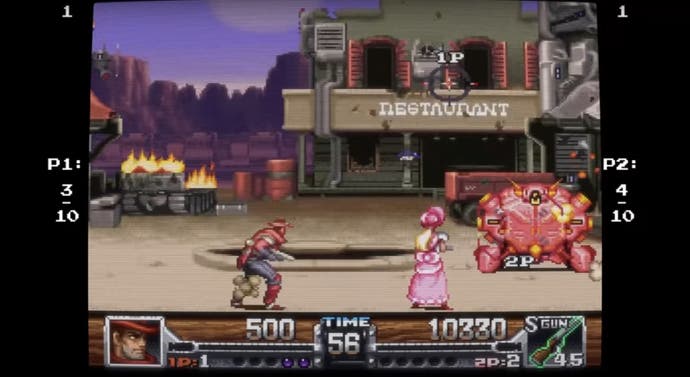
"Basically all of those games are in there," Foddy explains. "Some people have asked us why not just release a version with the save states. Don't actually include the games themselves. That doesn't work though, as for any computer system it loads the entire game and all the code into memory and that's what you're saving and reloading, so that wouldn't get you around that legally."
"It's something that we're having for festivals and events and museum shows, and for the odd streamer," Foddy says. "We would not make it available to the public. That's just sort of how it has to be."
Still, Multibowl! has received some traction, making the rounds at Wild Rumpus in London, Fantastic Arcade in Austin, and XOXO in Portland, where I first encountered it. "I would rather think of it as ephemeral rather than exclusive," Foddy says, noting that he's always looking for more places to showcase he and Thomson's private retro remix.
This lack of publicity hasn't deterred Foddy or Thomson in their passion for the project. "I think first and foremost it's just a cool game," Foddy says. "It's a cool game in its own right, albeit one that's made up of other games. It is its own thing, partially under the condition that its victory conditions are not the same as they were in the original games. So it's kind of repurposing games. It's kind of changing them in a collage-y way. So that I think is sufficient justification in its own right, even if it's something that can never have a wide release and can never make any money.
"But also it's a nice historical piece. I always worry about good games from history, especially lesser known ones, just sort of being erased from the cultural record because it gets much harder to play old video games than it is to play an old record or look at an old painting. It's like a way to get a little glimpse of a game without having to go through all the process of learning it."
